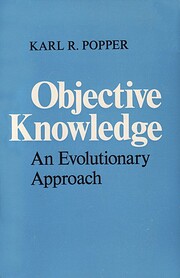

Carregue numa fotografia para ir para os Livros Google.
|
A carregar... Objective Knowledge: An Evolutionary Approach (original 1972; edição 1972)por Karl R. Popper
Informação Sobre a ObraObjective Knowledge: An Evolutionary Approach por Karl R. Popper (Author) (1972)
 Filosofía - Clásicos (99) Ainda não há conversas na Discussão sobre este livro. sem críticas | adicionar uma crítica
Pertence à Série da Editora
The essays in this volume represent an approach to human knowledge that has had a profound influence on many recent thinkers. Popper breaks with a traditional commonsense theory of knowledge that can be traced back to Aristotle. A realist and fallibilist, he argues closely and in simplelanguage that scientific knowledge, once stated in human language, is no longer part of ourselves but a separate entity that grows through critical selection. Não foram encontradas descrições de bibliotecas. |
Current DiscussionsNenhum(a)Capas populares
 Google Books — A carregar... Google Books — A carregar...GénerosSistema Decimal de Melvil (DDC)121Philosophy and Psychology Philosophy Of Humanity EpistemologyClassificação da Biblioteca do Congresso dos EUA (LCC)AvaliaçãoMédia: (4.36) (4.36)
É você?Torne-se num Autor LibraryThing. |
||||||||||||||||||||||||||||||||||||||||||||||||||||||||||||||||||||||||||||||||||||||||||||||||||||||||||||||||||||||||||||||||||||||
—Danieljean (Babelio)